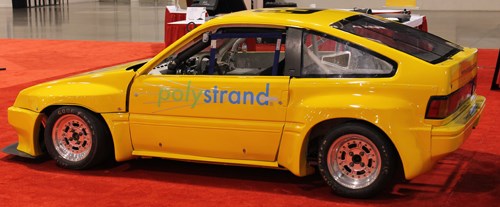Thermoplastic composites suspension featured on racecar
The Polystrand GT-Lite racecar recently completed its third racing weekend at the SCCA Majors event in Pueblo, Colo.
The racing environment is a good place to test out innovation in car design. After all, from the rearview mirror to seat belts, there’s plenty of every day car technologies that came from racing. Could a rear suspension outfitted with fiber-reinforced thermoplastic nylon springs and control arms be next on the list?
Thermoplastic composites specialist Polystrand (Englewood, Colo.) developed the GT-Lite racecar, a purpose-built racing vehicle designed to highlight the application of thermoplastic composite materials in automotive applications. The racecar recently completed its third racing weekend May 28-29 at the Home of the Heroes SCCA Majors event at Pueblo Motorsports Park in Pueblo, Colo., with podium finishes in both the sprint race and the feature event. Polystrand believes this is the first vehicle to use continuously-reinforced thermoplastic (nylon) composites as the primary suspension springs. Check it out here:

“While thermoplastics have been in use in motor vehicles for decades, we believe that this application of continuously reinforced thermoplastics as the primary suspension springs to be the very first in the industry,” says Ed Pilpel, president of Polystrand. “We strongly believe that reinforced thermoplastics offer an excellent opportunity in automotive lightweighting applications due to their ease and speed of processing, and offer a cost-effective, recyclable alternative to current materials.”
The car, bodied as a 1987 Honda CRX, features a multi-link independent rear suspension system designed by Jonathan Spiegel, Senior Engineer for Polystrand. Spiegel also holds a competition license and drove the car at these events. “In our first outing at MSR Houston, we chased minor electrical and braking problems during the event that prevented us from finishing the races, but the suspension system never missed a beat. The second event at Gateway Motorsports Park, we had some oil pressure issues and a small leak, but still managed a fifth place finish."
But he said during the race in Pueblo, everything came together. "We were pretty confident that the suspension would work well, but the performance has far exceeded our expectations, and we haven’t made a single change to the system yet," he said.
Here are some facts regarding material and design: The springs and upper control arms of the rear suspension are manufactured from PA6 nylon resin, and are reinforced with PPG Industries Inc. (Pittsburgh, Pa.) TufRov 4510 continuous E-glass fibers. The prototype springs were compression molded from Polystrand continuously reinforced thermoplastic tape at the Materials Processing and Applications Development (MPAD) Center at The University of Alabama, Birmingham (UAB) School of Engineering. Also featured on the car is a reinforced polypropylene front splitter and hybrid interior sandwich panels made of reinforced PETG thermally bonded between thin layers of aluminum and stainless steel, manufactured in-house at Polystrand using PPG TufRov 4588 reinforcement.
of the Pueblo SCCA Majors race.
“We couldn’t have accomplished these milestones without the continued efforts of PPG,” says Spiegel, “and we’d also like to acknowledge the strong support from several automotive aftermarket companies: AEM Performance Electronics, Action Clutch, Brian Crower, HASport, and Honda Performance Development, who provided the products necessary to make the car competitive.”

The car.
Related Content
Owens Corning to sell glass fiber business to Praana Group
Transaction with India-based holding group completes Owens Corning’s previously announced strategic review of the business, strengthens its focus on residential and commercial building products.
Read MoreHigh-tension, vertical filament winding enables affordable flywheel energy storage system
French startup Energiestro’s prototype solar energy flywheel-based storage system aims to reduce costs with glass fiber composites and prestressed concrete.
Read MorePUR composite sandwich panels for 3D automotive parts, high-volume panels and more
At its U.S. sites, Ascorium produces glass fiber/PUR 3D parts via semi-automated molding, high-volume flat panels via a continuous line while working toward bio-based PUR and recycling.
Read MoreJEC World 2025 highlights: Evolving recycling and biomaterials technologies
CW technical editor Hannah Mason shares sustainability-focused composites trade show highlights featuring maturation, scale-up, new partnerships, and new technologies in biomaterials and recycling.
Read MoreRead Next
All-recycled, needle-punched nonwoven CFRP slashes carbon footprint of Formula 2 seat
Dallara and Tenowo collaborate to produce a race-ready Formula 2 seat using recycled carbon fiber, reducing CO2 emissions by 97.5% compared to virgin materials.
Read More“Structured air” TPS safeguards composite structures
Powered by an 85% air/15% pure polyimide aerogel, Blueshift’s novel material system protects structures during transient thermal events from -200°C to beyond 2400°C for rockets, battery boxes and more.
Read MorePlant tour: Daher Shap’in TechCenter and composites production plant, Saint-Aignan-de-Grandlieu, France
Co-located R&D and production advance OOA thermosets, thermoplastics, welding, recycling and digital technologies for faster processing and certification of lighter, more sustainable composites.
Read More













